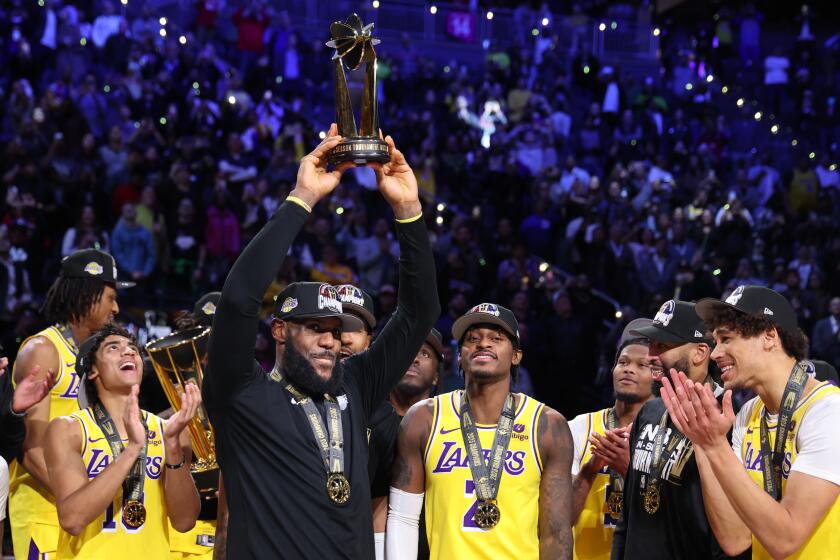Derek Boogaard’s death raises questions about head injuries in NHL
Ron Salcer, a longtime hockey agent based in Manhattan Beach, spent most of last week talking business with New York Rangers forward Derek Boogaard. When they met to celebrate Boogaard’s final night in Southern California, Salcer brought his family.
“We had a great dinner. My daughter said how good he looked, how happy he was,” Salcer said. “We said goodbye Wednesday night, he traveled Thursday and on Friday I got the phone call from his brother.”
The call brought unfathomable news. Boogaard, who kept an apartment in Minneapolis after playing five seasons for the Minnesota Wild, had been found dead there by two of his brothers. Police uncovered no signs of foul play. An autopsy was conducted Saturday, but the medical examiner’s conclusions and results of laboratory tests aren’t expected for several weeks.
“It’s terrible,” Salcer said Monday, his voice breaking as he arrived in Minneapolis to join the Boogaard family in mourning.
“To lose a 28-year-old. … I don’t have a whole lot of answers.”
No one does.
Boogaard was a brawler on the ice but otherwise selfless and gentle enough to be described as a “teddy bear” by his sister Krysten during a fan-inspired memorial Sunday. He suffered a season-ending concussion Dec. 9, at least his fourth. He may have suffered others before awareness was raised in the hockey world about the symptoms and risks of head injuries, an educational process that’s plodding along.
It’s too early to speculate whether that last concussion contributed to his death. Salcer said Boogaard “was feeling good about things,” and the Minneapolis Star Tribune reported that Boogaard had told friends he was eager to work hard this summer and resume his career.
But Boogaard and his family wondered enough about the effects of those blows to the head to consider donating his brain to Boston University’s Center for the Study of Traumatic Encephalopathy, whose researchers announced in March they had found evidence of degenerative disease in the brain of former NHL enforcer Bob Probert.
Boogaard was approached by researchers after the Probert study was made public. His family signed the donation papers over the weekend. His funeral will be held Saturday at the Royal Canadian Mounted Police Depot in Regina, Canada, where his father, a brother who’s a Mountie and two uncles had trained. Boogaard had spoken to Salcer about his admiration for the National Guard.
“I’ve been working with hockey players for 30 years and I’ve always thought they epitomize the highest of morals, values and ethics, and Derek epitomized that,” Salcer said. “It’s devastating.”
Al DiRoberto of Fullerton, who has a TV production company and coached youth hockey in New York and California for 25 years, feared he might someday get the terrible phone call the Boogaards did.
DiRoberto’s son, Torrey, was a prolific junior hockey scorer and usually had hefty penalty-minute totals too. A junior linemate of current San Jose forward Patrick Marleau, DiRoberto was chosen by Buffalo in the fifth round of the 1997 NHL entry draft. The 5-foot-11, 190-pound left wing spent four seasons in the minor leagues and reached the American Hockey League with the Ducks’ Cincinnati affiliate. After he suffered his third recorded concussion, at age 25, Al DiRoberto urged him to quit.
“He was knocked unconscious and then he was vomiting,” Al DiRoberto said. “When I got that report, I talked to him on the phone and I told him, ‘You did six years of pro. You went a long ways. There’s no sense in becoming permanently disabled from this.’ And he understood that.
“As a parent we just got to the point where I felt we had to talk about it.”
Torrey was a speedster, not a fighter. But Al said opposing coaches would send checkers to rough him up and Torrey, as a former roller hockey player and then-rare California product, often had to defend himself.
“He was told, ‘You want to get to the next level you’re going to have to scrap somewhat,’ ” Al said. “He was a pretty scrappy little guy, but this is a tough business when you’re trying to be a pro hockey player.”
Torrey DiRoberto, luckily unburdened by post-concussion syndrome, is in medical sales, Al said proudly. He’s married and the father of two. Derek Boogaard and his family won’t reach those milestones.
“I feel for them,” Al DiRoberto said.
As do we all.
twitter.com/helenenothelen
More to Read
Go beyond the scoreboard
Get the latest on L.A.'s teams in the daily Sports Report newsletter.
You may occasionally receive promotional content from the Los Angeles Times.











